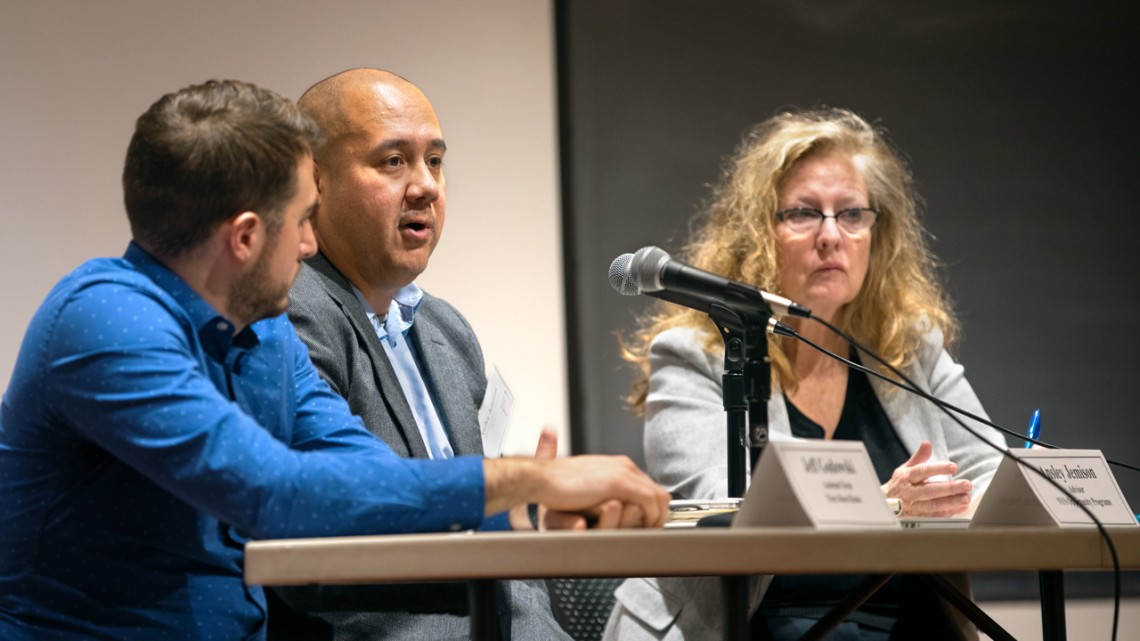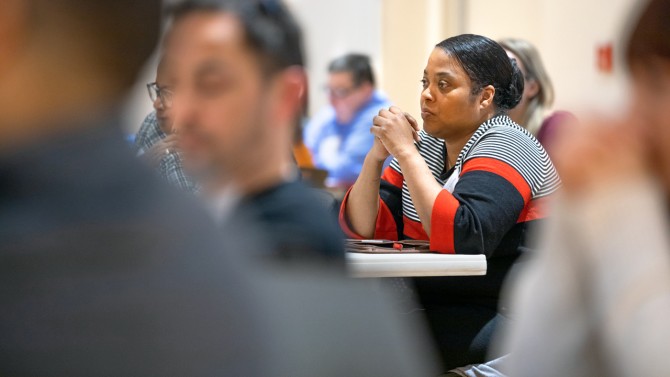
A panel on community partnerships, from left: Jeff Godowski, assistant dean of Flora Rose House; Ansley Jemison, adviser for New York State Opportunity Programs; and Joyce Muchan ’97, assistant director for student development at the Public Service Center.
Staff share experiences in community-engaged work
By Daniel Aloi
Cornell staff members from across campus took part in the second Community Engagement Staff Institute, Jan. 7 in the Biotechnology Building.
The biennial event, organized by the Cornell Public Service Center (PSC) and the Office of Engagement Initiatives, is for staff working with students and faculty involved in community-engaged learning. More than 70 staff members from Student and Campus Life and various units, schools and colleges attended.
“Many times, students will remember those activities that took place outside of the classroom as being more fundamental to forming who they are and their career options and their identities than necessarily a course that they took,” said Katherine McComas, vice provost for engagement and land-grant affairs. “In all cases, how you encourage students to work with and learn from community members is also important, to ensure that they’re having a positive impact as they learn.”
In his introduction, Mike Bishop, director of student leadership in the Office of Engagement Initiatives, said: “There’s power in walking with students and disclosing with them our successes and also our failures. I found that the deeper the commitment I made to communities and my professional work, the stronger the student learning, and the deeper the impact in communities – so that commitment is paramount.”
The event featured a panel on experiences with community partnerships.
“We have a lot of students that come into the Public Service Center every day, who want to make the world a better place. And sometimes their vision or idea is vacant of any kind of community interaction,” said Joyce Muchan ’97, assistant director for student development in the Public Service Center.
Muchan said the PSC’s partnerships include K-12 programs in local schools and Upward Bound for high school students.
“We also have a depth of expertise,” she said. “I’m on the Human Trafficking Southern Tier Task Force, and I integrate students into that task force so that they’re understanding the human trafficking pipeline and the needs.
“Understanding the back end of the issues in the community is important,” she added. “The [community partner] has their own job that they’re needing to do for the community.”
Students from Flora Rose House on West Campus work with Beverly J. Martin Elementary School and the A-Plus MakerPlace program in Ithaca, and with the SPCA of Tompkins County, said Jeff Godowski, assistant dean.
“We have about [16 students] who regularly go and volunteer at those organizations every two weeks and then write blogs about their experience, ways that they can critically reflect about how they’re engaging with our community partners and with the folks they’re serving,” he said. “The students who work at Beverly J. Martin help tutor elementary school students, and learn more about Ithaca and Tompkins County and the community population that they serve. The SPCA is an opportunity for them to work with the cats that are rescued.”
Flora Rose House Fellows include advocates from community partners such as the Cancer Resource Center and the Finger Lakes Land Trust, and Tompkins County Court Judge Scott Miller, “who engages students in ways to think about the court system and think critically about ethical issues that we might face in that role,” Godowski said.
Ansley Jemison, adviser for New York State Opportunity Programs in the Office of Academic Diversity Initiatives and former residence hall director of Akwe:kon, said he received a grant for a podcast called “Ögwe'ö:weh” – a Seneca word meaning “the original people.”
“I’m speaking to folks who are doing positive work in the communities that they’re a part of,” he said, “and trying to make a connection across native communities with other people – hopefully having a broader reach where people are going to get connected with one another and understand what type of work is happening in the community. For example, I’m talking to historians, community leaders, maybe a chief or a clan mother; I’m also talking to artists, talking to farmers, talking to athletes. I want to tell more of a contemporary story about what native people are doing.”
The podcast also was conceived with the idea to “get some equipment and bring that to Cornell,” Jemison said. “I work with the Educational Opportunity Program, so it’s low-income and first-generation students. I’d like to actually do one of those ‘each one, teach one’-type programs where more students from the EOP are sitting down and actually having conversations and maybe dispelling some of the myths and rumors about these type of programs.”
In her keynote address, Tompkins County Legislator Leslyn McBean-Clairborne discussed “engaging with community,” and advocated for a process that allows for planning, discussing ideas and assessing needs and mutual benefits for partners before beginning a project. The work ideally should be sustained, she said, to continue after a student project ends.
McBean-Clairborne is executive director of the Greater Ithaca Activities Center and chairs the legislature’s Workforce Diversity and Inclusion Committee.
Participants also gathered in facilitated small-group breakout sessions on topics of: partnership building, with Anna Sims Bartel; resources for preparing students for community-engaged learning, with Joy Das; and models for critical reflection, with Richard Kiely.
Media Contact
Get Cornell news delivered right to your inbox.
Subscribe

